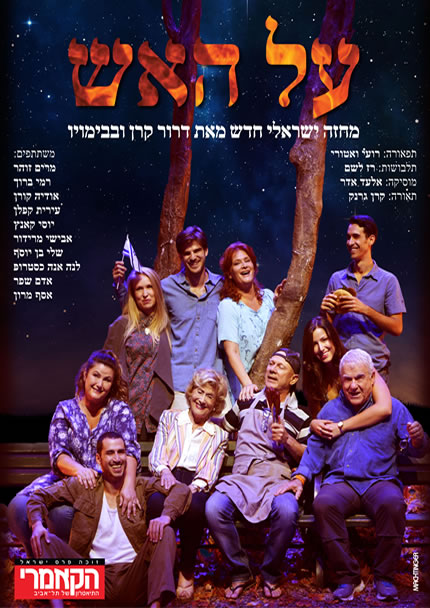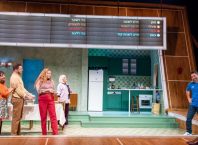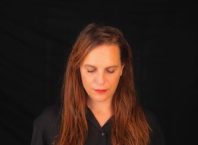On The Grill, Dror Keren’s debut as a playwright/director is a snapshot of Israeli society that gives a sense of the complex composition and tensions of the present moment, colored by shades of history, individual and collective. In this play Keren revisits the landscape of his childhood, the Jezreel Valley, evoking, like the last flickering embers of a fire, a way of life that has all but disappeared from Israeli culture: the kibbutz.
The kibbutz is an emblem of the changes in Israeli culture: a dream of an egalitarian society, founded long before the State, that came to symbolize the ultimate Israeli – the new Jews, strong, stoic, working and loving the land, sharing everything and raising their children together with visions of a utopian future. Yet for the individuals within the collective, life decided by committee vote could be very difficult. Many left the kibbutz to pursue their own dreams. Over the years, as the economy changed, and financial difficulties accrued, many kibbutzim had to make the difficult decision to abandon their way of life and submit to privatization. On The Grill presents three generations, each with a different relationship to the kibbutz: Gizella, the grandmother, who came as a refugee after WWII; Zvika, Rochale, and Avinoam who represent the generation born on the kibbutz – those who inherited the dream and saw it fade; Mordi, Alona and Gilad – young people trying to build their own lives on the shifting, unsteady foundations of the past.
On The Grill works with the symbols of Israeli culture to tell a story that is very personal and emotional, yet has a broader resonance. The play is set on the eve of Independence Day celebrations, a holiday which has come to be represented in popular culture by a frenzy of grilling with mass consumption of meat. Yet figuratively speaking, it’s not just the meat that is on the grill.
Zvika and Rochale are the hosts of the gathering, and their son Mordi has come home for his first visit after four years in Berlin, bringing a surprise guest: his German girlfriend Johanna. There are many tensions beneath and above the surface, and many tangled relationships among the friends and family who have come together on this night, while out there, beyond the family home yet all too close, the threat of impending war looms large and loud.
On The Grill captures the mood and spirit of the different generations to create a lively and realistic portrait of Israeli society today, that particular segment of society that is called “the salt of the earth”: the kibbutz. Keren is well known as a comic actor, and his sense of comedy serves him well in this production. There are lots and lots of laughs in this drama, and some of the funniest grow out of the very tensions that underlie the drama, such as Johanna’s first encounter with Mordi’s parents. Adam Sheffer brings a bright spark to his role as Raja, the other outsider – Gizella’s Sri Lankan caretaker. His devotion to “Ima” (it means mother in Hebrew) as he calls Gizella, adamant about keeping her away from the sweet wine that will aggravate her diabetic tendencies, and his sincerity make him a very likeable character who not only generates many funny moments in the play, but also serves to reveal the kinds of prejudice that can hide beneath the egalitarian outlook of kibbutz members such as Avinoam.
Keren’s use of song is one of my favorite aspects of the play. Folk songs and group sing-alongs are an important aspect of Israeli culture, and have come to symbolize both the dream and its dissolution. When the young soldier Gilad jokes and improvises on the guitar, his affectionate teasing evokes the feel of a family gathering that is sure to strike a chord with many viewers. Most moving is when Mordi sings for his grandmother Gizella a song by the poet Shaul Tshernichovsky “I Believe”, translating for Johanna’s benefit: I am a dreamer, I believe in the human spirit.”
On The Grill
Written and directed by Dror Keren
Set: Roy Vatury; Costumes: Raz Leshem; Music: Elad Adar: Lighting: Keren Granek; Assistant director: Danny Levy; Cast: Miriam Zohar (Gizella), Rami Baruch (Zvika), Odeya Koren (Rochale), Irit Kaplan (Tirtza), Yossi Kantz (Avinoam), Avishai Meridor (Mordi), Lena Anna Castrup (Johanna), Shely Ben-Joseph (Alona), Adam Sheffer (Raja), Asaf Maron (Gilad






